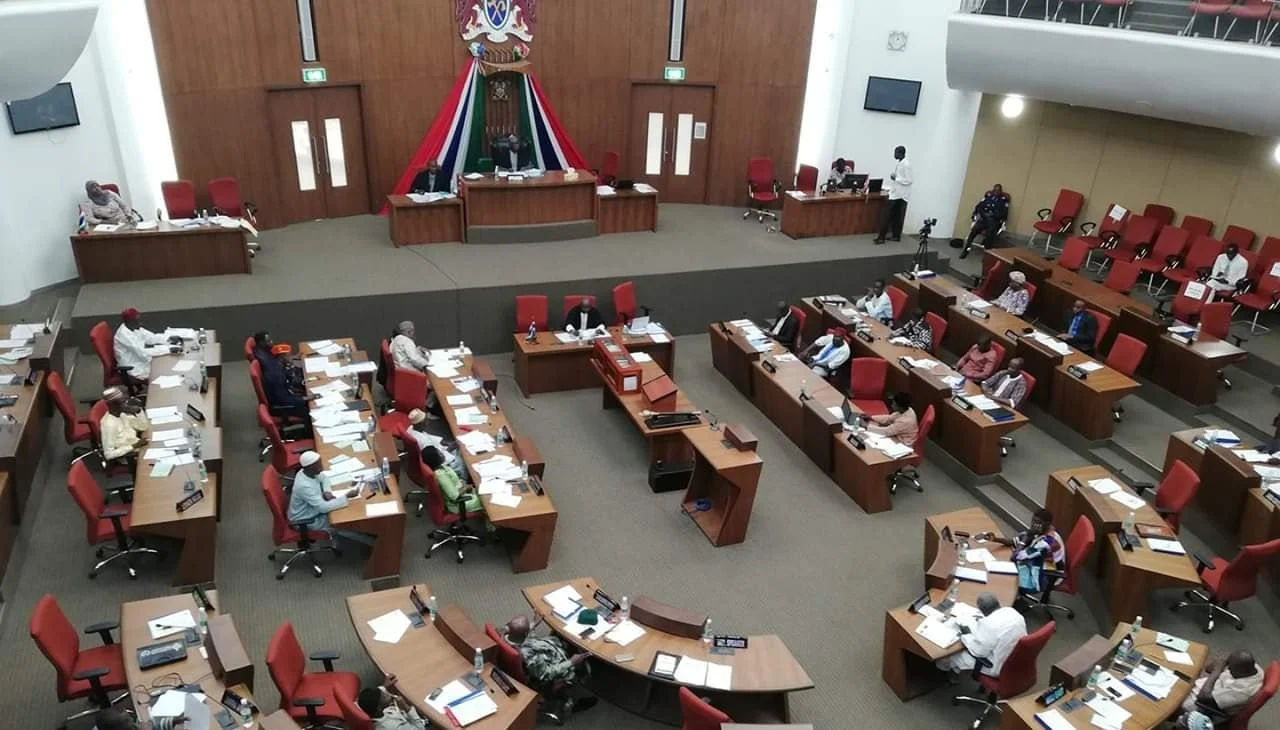Post Legislative Scrutiny: A Tool for National Assembly to Evaluate Laws of The Gambia
Introduction
One of the important roles of parliament is to make laws that meet the needs of the people. The process of lawmaking, otherwise called legislation, generally entails a series of parliamentary procedures that seek to review the needs of society with a view to responding to those needs appropriately and adequately in an efficient and resourceful manner.
Post legislative scrutiny or ex-post evaluation of legislation is generally recognised as a tool for evaluating and assessing enacted laws by parliament to inform itself of how these laws affect the lives and livelihoods of the citizens. Franklin De Vrieze describes PLS as a stand-alone activity that enables a parliament to self-monitor and evaluate and reflect on the merits of its own democratic output and internal technical ability. Often, and despite the best of intentions it might have, the focus of parliament at the time of legislation is to have the law enacted. It rarely pays attention to how well the law is being implemented over time and its resulting positive and negative effects. Thus, in PLS, parliament is availed the opportunity to directly evaluate and assess the efficiency, effectiveness, and impact of its laws on society. This helps parliament to understand whether a law or set of laws has served the purpose for which they were enacted or not, and if not, then parliament could decide to correct the anomaly.
The process of assessing the effectiveness of a law is multifaceted and is not automatic. The implementation of any law is largely tied to an inextricable network of factors that include funding, compliance, commitment, support and cooperation from institutions and citizens, as well as changes in the politics and economy of the country or society. Consequently, the London Declaration on PLS noted that the implementation of legislation depends on such factors as the clarity of the legislative texts; compatibility with other laws and the constitution; availability of human and financial resources to implement the law; full and unrestricted access to the legislation by enforcement authorities; and timely issuing of secondary or delegated legislation.
To this end, the ultimate objective of PLS is for parliament to oversee the implementation of the laws it has passed, take note of the areas that were successful and highlight those that require improvement. It also gives Parliament the opportunity to gather from the individual and collective experiences of the citizens regarding the implementation of the law and prepare itself for a review where required to ensure that laws always benefit citizens.
This paper is an attempt to popularise the concept of PLS for the National Assembly of The Gambia in particular and parliaments in general. It is anticipated that the National Assembly may consider using PLS as a tool of engagement and assessment of its passed laws. Using a comparative approach, this paper discusses the use of PLS in other jurisdictions, underscores some laws in The Gambia that could be subjected to PLS and makes some compelling conclusions.
Post Legislative Scrutiny in perspective
Social theorists often argue that the fundamentals of any law for a society is to shape and improve the lives of the people through what that law permits or prohibits. In other words, the need for a law is to constrain or empower, restrict or enhance. Therefore, while parliaments debate legislation, it should not be seen as the end of the process because a law may have unintended outcomes or simply have no effect at all.
PLS is often done through a committee of parliament that may either be set up for this purpose or assigned on an ad hoc basis. Parliamentary committees offer the most direct form of engagement. From jurisdiction to jurisdiction, the nature and terms of reference of a committee differs. In parliamentary jurisdictions like Indonesia and Belgium, there are committees set up for the specific task of ex-post evaluation of legislation. However, there are others, including in South Africa, that are set up on the basis of necessity and usually outsourced to investigate specific issues of ex-post evaluation of legislation. For the House of Commons and House of Lords of the UK, all the committees have the freedom and latitude to conduct PLS. In most parliamentary jurisdictions where ex-post evaluation of legislation is done, the law has to be in place for at least three to five years before PLS can be sanctioned.
In a WFD-funded review, De Vrieze and Hasson (2017) reveal that the Federal Parliament of Belgium created a parliamentary committee in 2007 for the specific mandate of ex-post evaluation of legislation. The responsibilities of the committee include: to receive petitions that highlight problems arising from the implementation of a specific law that has been in force for a minimum of three years; to conducting post-legislative review on the basis of recommendations made by the rulings of the Court of Arbitrage/Constitutional Court on the application of specific legislation; and to respond to issues raised in the annual report that is submitted by the General Prosecutor of the country to Parliament, highlighting problems related to the interpretation or enforcement of specific laws.
De Vrieze and Hasson note that in Indonesia, the House of Representatives established a Standing Committee on Legislation, referred to as Badan Legislasi (BALEG), that has a central role in the law-making process within the parliament, particularly in conducting Post-Legislative Scrutiny. They reveal that the Committee monitors whether the government enacts implementing regulations or not, monitors if the law is being challenged at the Constitutional Court, and evaluates the applicability of the laws by the implementing agencies and the impact of the laws on the people. BALEG refers the results of its Post-Legislative Scrutiny to relevant subject committees, which then take further actions to government ministries, agencies, or judiciary agencies within their jurisdictions.
In South Africa, since the Parliament does not have the internal capacity to do PLS, it has commissioned an external panel of senior experts to systematically examine the effects of laws passed by the National Assembly since non-racialised majority-rule was established in 1994. De Vrieze reveals that in the 2004 report of the UK House of Lords’ Constitution Committee, there was a recommendation for PLS to be a routine feature of parliamentary scrutiny. The Committee took a holistic view of the legislative process, encompassing not only the passage of a bill after introduction but pre-legislative scrutiny and post-legislative scrutiny.
It can be adduced that scrutinising the implementation of a law may take the form of a committee hearing where government representatives, along with other stakeholders such as civil society organisations that work on such specific issues, can be invited to report on the implementation of the law. And as a follow-up, committees can make specific recommendations to the House or the plenary. The rationale for these recommendations and their adoption is to lend greater credence and attention to some provisions of the law that are either not being implemented or only partially implemented. If parliament adopts these recommendations, the committee thereafter monitors their implementation. In some cases, discussions on the implementation of a law may lead to immediate legislative amendments that may propose corrective intervention or readjust the original provisions of the law to accommodate events that have transpired since the law was adopted.
According to Franklin De Vrieze, a parliament’s capacity and performance in PLS are, to a significant extent, determined by the presence of parliamentary procedures and structures that are specific to PLS and the extent to which the PLS inquiries generate written findings and recommendations (PLS reports), as well as monitoring and conducting follow-ups to those findings.
The status of oversight at the National Assembly of The Gambia
The National Assembly has twenty-three (23) committees. Fourteen (14) of these committees are standing committees whilst eight (8) are select committees. The Constitution empowers the Assembly to establish standing committees. However, the establishment of a select committee is dependent on the need for it. The Assembly can establish as many select committees as it considers necessary through a motion tabled by the Committee of Selection (Standing Order 95(3)). In accordance with Standing Order 95(5), special select committees may also be established to deal with any specific time-bound matters.
The National Assembly has not assigned an exclusive mandate to any committee to evaluate laws. However, all committees are directed to identify, monitor, and cooperate with all MDAs in matters relating to their terms of reference and to receive and review Bills, activity reports, domestic and foreign policies, agreements, strategic plans and other measures and decisions of the institutions under their purview.
The focus of National Assembly oversight or scrutiny by its committees is mostly limited to how the budget is being implemented as appropriate based on the annual estimates approved by the Assembly. Each of the committees of the Assembly works with its line ministries, departments, and agencies (MDAs) to monitor and measure the extent to which resources and services are being distributed and delivered and to determine the impact of this distribution and delivery on the lives of the common people.
The committees invite sectors and interface with them, receive reports from institutions that may outline the details of their activities, and make field visits to assess the performance and challenges of institutions vis-à-vis their terms of reference. For example, in 2022, when a massive oil spill occurred at Mandinary Oil Depot in the West Coast Region, the Committee on Environment visited the site to assess the veracity of the damage caused. The Committee on Health also visited some major hospitals and pharmacies and had a series of engagements with the concerned authorities when an Acute Kidney Injury outbreak was declared in the country that killed over four dozen children. These incidents have been noted as the result of the failure of institutions to implement and enforce the existing laws effectively. However, in each of these instances, the focus was never on how well the law was implemented. Instead, the focus was on establishing the factors that led up to those incidents. It may be argued that if the laws are being periodically reviewed to assess the extent to which they have been implemented and benefitted the people, such incidents may likely not occur.
Some laws that could be reviewed
The Constitution of the Republic of The Gambia vests the legislative power of the State (power to make and amend laws) in the National Assembly. The Constitution also empowers the National Assembly to delegate some of its lawmaking powers to an individual or other body. In The Gambia, any law made by a person or body by virtue of delegated law-making power is referred to as subsidiary legislation (also known as secondary legislation, subordinate legislation, or delegated legislation). Subsidiary legislation must generally be made within the framework of an Act of the National Assembly. In this regard, a case can be made for the Assembly to monitor the exercise of the lawmaking power it has delegated through a review of the implementation of subsidiary legislation.
It could be argued that some of the laws of The Gambia are obsolete or have no longer been implemented. Some of these laws include the Motor Traffic Act, 1948; Price Control Act, 1974; Injuries Compensation Act, 1990; The Gambia Fertilizer Fund Regulations, 1966; Old Metal Dealers Act, 1917; Skin Bleaching (Prohibition) Act, 1996; and the Anti-Littering Regulations, 2007. The ultimate intent of any law is to improve, deter or regulate human behavior and the way societal structures are managed. Where this cannot be achieved by any law, then there is no need for it.
The proposal for a thorough review of the Motor Traffic Act of The Gambia, for instance, is informed by the appalling rate and gravity of road traffic accidents in the country. It could be that this law does not suffice to deter the behaviours that lead to the occurrence of the serious accidents on the roads, or the provisions are not adequately implemented and enforced. In April 2022, the Point Newspaper reported that the World Life Expectancy ranked The Gambia fourth place among world’s worst countries where accidents are mostly registered. The report indicated that the total number of accident cases recorded in The Gambia by April 2022 reached 11,995, whilst the death toll accelerated to 365. It further noted that from January to April 2022 alone, The Gambia registered a whopping 1,825 cases of road accidents.
The proposal for a thorough review of the Price Control Act is informed by the apparent lack of price control in the market, which has contributed to the increase in prices of goods and commodities at a high, frequent, and unpredictable rate.
As to the Injuries Compensation Act, the proposal to review this Act is informed by the need to protect all persons, especially those working in the public sector who sustain injuries or die of injuries sustained at work and to allow the compensation scheme to accord with existing realities.
The proposal for a thorough review of the Skin Bleaching (Prohibition) Act is informed by the March 2021 claim of the executive Government of The Gambia that it lacks the required resources to implement and enforce the Act. A bill was subsequently tabled before the National Assembly to repeal the Act. However, the bill could not get the required votes to pass. The general claim of the Members that voted against the repeal was based on religious principles.
How can the National Assembly incorporate Post Legislative Scrutiny in its oversight functions?
There are three options available to the National Assembly should it decide to use PLS to monitor the implementation and improve the quality of its legislations. According to De Vrieze, the options available to parliament are as follows:
First, parliament could require ministries to provide regular reporting to parliament on the implementation of laws after three or five years of their enactment.
Based on this, the National Assembly could require government ministries, departments and agencies to regularly report to parliament on laws that are three to five years into their implementation just as they are already doing on their terms of reference. To do this, and for ease of reporting and assessment, committees, in collaboration with the Office of the Clerk and support partners such as the CSOs, may provide a template or a scorecard that MDAs would use as guide.
Second, parliament could outsource or commission research on the implementation of a law to external institutions, either autonomous official institutions (such as the Auditor General’s Office) or external independent institutions such as universities.
The National Assembly could equally outsource or commission research on the implementation of specific laws. In other words, the National Assembly can commission research by inviting research institutions in the country to evaluate the degree to which a certain law or collection of laws has been implemented. This would include outsourcing research to specific external and autonomous official institutions such as the National Audit Office, Judiciary of The Gambia, or independent institutions such as the University of The Gambia, especially where the workload required would overwhelm the capacity of the Assembly Service.
Third, the parliament could conduct its own inquiries on the implementation of selected laws by holding public hearings, collecting evidence, and conducting in-house research by staff of the Parliament, such as through a research unit or legislative unit.
To this end, the National Assembly could initiate and conduct its own inquiries on the implementation of selected laws by holding public hearings, collecting evidence, and conducting in-house research by staff of the Assembly Service, such as through the Research Unit. It could be argued that assigning such duties to the Assembly Service might be more cost effective. The Assembly could also establish a specific committee or committees for the sole purpose of conducting PLS or incorporate PLS as part of the terms of reference of all its committees.
What challenges would the Assembly likely face in adopting Post Legislative Scrutiny as a tool?
The National Assembly of The Gambia is a legislative parliament with most of its scrutiny and oversight activities centered around assessing the trickledown effect of national resources and services to the people.
Since the focus in “legislative parliaments” is mainly on debating and adopting legislation, and oversight is often limited to budget oversight, De Vrieze opined that introducing PLS in such parliaments will broaden its oversight functions, giving it a new agenda that would result in new workload for both staff and MPs.
Therefore, while the National Assembly is being encouraged to adopt PLS as a tool in its parliamentary business, it is equally encouraged to address critical human resource and capacity challenges of the National Assembly Service, factors that are central to the success of the tool.
Conclusion
PLS is a tool that encourages citizens’ participation and engagement with parliament. When enhanced, these engagements can serve to reduce ambiguity and public distrust as the citizenry would be more informed of the activities, powers, and limitations of the National Assembly.
PLS will help NAMs to better understand how the laws they pass affect the people. In this regard, the National Assembly could opt to evaluate the laws of The Gambia itself or commission independent research to look at some of the archaic laws in our statute books that no longer serve the relevance and purpose for which they were legislated. However, the Assembly must first review its Standing Orders to provide for PLS prior to introducing it. As it is, there is no provision in the Standing Orders of the National Assembly that advocates for post-evaluation of legislation.
SUGGESTED CITATION: Dumbuya Alhagie M., Post Legislative Scrutiny: A Tool for National Assembly to Evaluate Laws of The Gambia, Law Hub Gambia blog, August 9, 2023, www.lawhubgambia.com/lawhug-net/post-legislative-scrutiny.
REFERENCES
·The London Declaration on Post Legislative Scrutiny. Westminster Foundation for Democracyhttps://parlamericas.org/uploads/documents/2018-12-19%20Declaration%20on%20PLS%20-%20EJLR_ENG.pdf (accessed 19 January 2023).
· Franklin De Vrieze and Victoria Hasson. (2017). Post-Legislative Scrutiny: Comparative study of practices of Post-Legislative Scrutiny in selected parliaments and the rationale for its place in democracy assistance. (2017). Retrieved on January 12, 2023, from https://www.wfd.org/sites/default/files/2022-01/Comparative-Study-PLS-WEB.pdf
· Parliamentary Innovation. (16 June 2022). Seven questions on Post Legislative Scrutiny. Retrieved on January 12, 2023, from https://gpgovernance.net/seven-questions-on-post-legislative-scrutiny/
·Franklin De Vrieze. (23rd July 2018). A Guide to Post-Legislative Scrutiny. WFD. Retrieved on January 27, 2023, from https://www.wfd.org/what-we-do/resources/guide-post-legislative-scrutiny
· Franklin De Vrieze. (27th Sept. 2021). Parliamentary and legislative indicators for Post-Legislative Scrutiny. West Minster Foundation for Democracy. retrieved on January 31, 2023, from https://www.wfd.org/sites/default/files/2022-02/2021-09-27%20PLS%20indicators%20-%20Concept%20Note_.pdf
·European Partnership for Democracy (EPD). Expert insight: Why Post-Legislative Scrutiny may be considered a public good. Retrieved on January 31, 2023, from https://epd.eu/2021/03/17/post-legislative-scrutiny-public-good-lord-norton-de-vrieze/
· Revised Standing Orders of the National Assembly of The Gambia. (2019).
· Pa Modou Cham. (Apr 27, 2022). Gambia ranked 4th in world's road accident. Retrieved on February 6, 2023, from https://thepoint.gm/africa/gambia/headlines/gambia-ranked-4th-in-worlds-road-accident
· Modupeoluwa Adekanye. (March 23, 2021). Gambian Members of Parliament To Uphold Skin-Bleaching Ban. Retrieved on February 6, 2023, from https://guardian.ng/life/gambian-members-of-parliament-to-uphold-skin-bleaching-ban/
Ahlagie M. Dumbuya
About the author
Alhagie M. Dumbuya is the Director of Research and Library Services at the National Assembly of The Gambia








